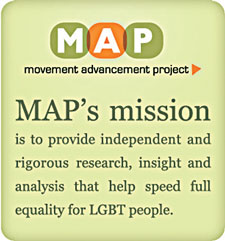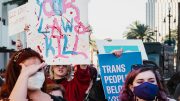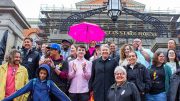A new brief released earlier this week by the Movement Advancement Project (MAP) reveals that a shocking 70 percent of the geographic area of the United States lacks any city, county, or state employment protections for lesbian, gay, bisexual, and transgender (LGBT) people, with comprehensive employment protections concentrated in just 30 percent of the country geographically.
To address the urgent need for these laws, hundreds of city and county councils throughout the country have passed local nondiscrimination ordinances (NDOs) to extend employment protections to LGBT people living in their jurisdictions. LGBT Policy Spotlight: Local Employment Nondiscrimination Ordinances examines city and county NDOs that prohibit discrimination based on sexual orientation and gender identity in private employment. The report details where these ordinances are geographically, their growth over time and the gaps in coverage that remain. [pullquote]“Vast geographic stretches in this country – mostly in rural areas – lack LGBT-inclusive nondiscrimination laws. Advocates have done impressive work extending local protections, but an LGBT person in a state that lacks statewide protections is fifty times more likely to be covered by local laws if he or she lives in an urban rather than a rural area. …”—Ineke Mushovic, Executive Director of MAP[/pullquote]
Local NDOs currently provide important job safeguards for thousands of LGBT individuals living in states that lack explicit statewide employment protections for LGBT people. For example, Florida has local NDOs covering more than 50 percent of the state’s population. Local ordinances also have been instrumental stepping stones toward statewide protections in many of the 19 states that currently protect LGBT people from employment discrimination. Combining statewide and local protections, more than 170 million Americans are living in areas with laws that explicitly protect them from being fired based on their sexual orientation, and more than 157 million are explicitly protected from discrimination based on their gender identity. However, nearly half of the country’s population remains unprotected from anti-LGBT employment discrimination.
“There is a deep rural-urban divide when it comes non-discrimination protections for LGBT people,” said Ineke Mushovic, Executive Director of MAP. “Vast geographic stretches in this country – mostly in rural areas – lack LGBT-inclusive nondiscrimination laws. Advocates have done impressive work extending local protections, but an LGBT person in a state that lacks statewide protections is fifty times more likely to be covered by local laws if he or she lives in an urban rather than a rural area. State and federal-level nondiscrimination laws are also essential in order to provide protections for everyone.”
As Congress considers the Equality Act, legislation that would provide federal nondiscrimination protections, MAP found that statewide protections exist in clusters of generally more progressive states in the west, Midwest, and Northeast. LGBT people in the Plains states and South largely lack employment protections.
Updated daily, the Movement Advancement Project’s Equality Maps track LGBT equality, populations, and other data by state. They provide up-to-date information on the status of state laws across a wide range of issues, from employment discrimination and relationship recognition to hate crimes protections and anti-bullying laws. The Equality Maps allow websites to embed the maps easily and for free. Visit lgbtmap.org/equality-maps to learn more.
A copy of the report is available here.








